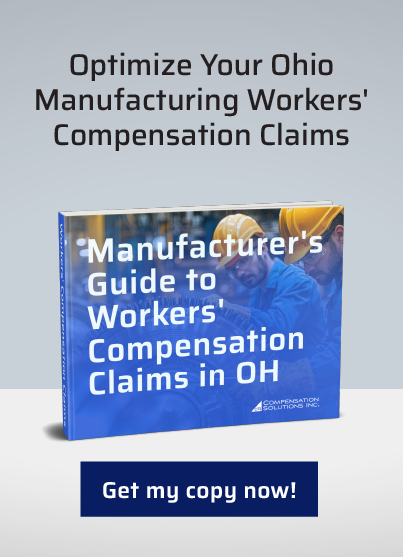The Ohio BWC and How a TPA Can Help Manufacturers Manage Workers' Comp

Ohio manufacturers reported nearly 18,000 workplace injuries and illnesses in 2023. For large and small companies alike, managing the resulting workers’ compensation claims can tax the resources of HR departments. While some claims are straightforward, others can be complicated, involving multiple parties and months or even years of investigation, reporting, and oversight before a claim is finally resolved.
The Ohio Bureau of Workers’ Compensation (BWC) guidelines can be difficult to navigate. Policies are regularly updated, and codes change in response to new state initiatives and legislation. HR personnel must continually participate in training to ensure that claims are managed in compliance with state workers’ compensation regulations.
The cost of workers’ comp premiums and the labor spent processing claims are substantial. The task of bringing these costs under control falls on HR managers and EHS leaders. Along with the immediate need to manage multiple claims, they must work proactively to reduce these costs, which requires training in risk management and knowledge of BWC incentive programs.
A third-party administrator (TPA) can lift the burden from your HR Department, as they have the experience and expertise in BWC policies to ensure that workers’ comp claims are filed accurately, timely, and in compliance with regulations. An Ohio TPA will also know which cost-saving programs your company can access to reduce premiums.
Know the Challenges of Managing Your Workers’ Comp Caseload
Even with vigorous safety protocols in place, workplace accidents will happen, and the oft-repetitive nature of manufacturing work can cause debilitating injuries over time, such as carpal tunnel syndrome, which are also compensable. Each injury or illness triggers a series of procedures that begin with the initial filing of a claim and conclude with case resolution.
Of course, the resources needed to process a claim will depend on the seriousness of the injury. Sprains, strains, and cuts are among the most reported injuries in manufacturing, and these claims are often quickly resolved. More extensive injuries, those that take weeks or months to stabilize, require the employer to continually track the claim’s progress, monitor the injured worker’s health status, and regularly communicate with medical providers and the BWC.
Overburdened HR departments may become mired in red tape and overwhelmed with their caseloads. The burden often falls onto supervisors and other administrators, diverting them from their primary responsibilities.
Ohio BWC Policies Are Complex and Continually Updated
The BWC is quite “form-heavy.” The official website lists nearly 200 forms, along with numerous publications on how to complete each one. Employers must file certain forms within specific time frames, and errors can result in delays in providing injured workers with the care and benefits that they need. Missed deadlines and inaccurate reports can also lead to legal issues for the company in the future.
Even veteran HR staffers who have mastered BWC regulations can struggle to keep up with BWC’s requirements. New safety and cost-saving initiatives, policy revisions for expediting claim processing, and updated legislation ensure that BWC policies are constantly changing. While this is generally beneficial and helps make the system more efficient, HR personnel must work to stay up to date.
Reduce Workers’ Comp Costs
Among Ohio industries, manufacturing has one of the highest rates of workplace injuries and illnesses, with 2.7 cases reported per every hundred full-time employees. This high rate, combined with increasing medical costs, translates into higher premiums. The BWC has rebate and incentive programs designed to help employers lower these costs. However, to realize these savings, an employer must be aware of these programs and know how to access them. Any staff already busy managing workers’ comp claims may not have the time to investigate ways to take advantage of premium reduction programs. Partnering with a TPA is a solution.
A Third-Party Administrator Can Streamline Claims Management
A TPA is a specialist who will serve as your advocate with the BWC. They will investigate claims to determine their validity and ensure that valid claims are filed accurately and on time. This is crucial because it ensures that your injured workers' needs are met, so they may return to work as quickly as possible.
Complex cases can be further complicated by the multiple parties involved, including the injured employee, the BWC, healthcare providers, a Managed Care Organization, and sometimes, attorneys. A TPA will handle communications with all stakeholders and ensure that the required paperwork is processed, relieving the burden on your staff. They will also support you through BWC hearings and audits.
Achieve Cost Savings with a TPA’s Guidance
In addition to streamlining claims management, your TPA can identify fraudulent and exaggerated claims that may artificially inflate your premiums. They will also ensure that your payroll and job classification data are accurately reported to the state; this way, the figures reflect your actual risk.
With a TPA, you can be confident that your business is taking full advantage of all current rebate and incentive programs, so you will not be paying more than necessary for your workers’ comp policy.
Know What to Look For in a TPA
The TPA that you select will become a vital part of your team. You want someone with a deep knowledge of BWC policies and procedures, someone who has a good relationship with the Bureau, a solid reputation in the industry, and experience overseeing workers’ comp claims for Ohio manufacturers. Most importantly, you want an organization that you can trust, one that is a good fit for your business and will give it personal attention.
Have Compensation Solutions, Inc. Be Your Advocate
Compensation Solutions, Inc. (CSI) has twenty years of experience helping businesses navigate the complexities of BWC policies. When you partner with CSI, you will be assigned a dedicated consultant; they will know your business, the status of ongoing claims, and your other unique needs. This consultant will be your primary point of contact when questions arise, and CSI will ensure that claims are handled efficiently and accurately and that cost-saving opportunities are maximized.
With CSI onboard, your HR department will receive much-needed assistance, you can be confident that your injured workers will get the benefits that they need, and your business will not overpay for workers' compensation insurance.
Managing workers' compensation claims in Ohio shouldn’t be a headache. Partner with CSI to take the hassle out of claims, lower costs, and stay compliant with Ohio BWC regulations. Focus on your business and employees, and let our seasoned experts guide you through the complexities of workers' comp. Contact us today to streamline the process and experience stress-free claims management!

